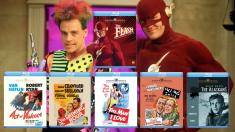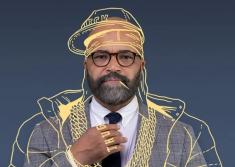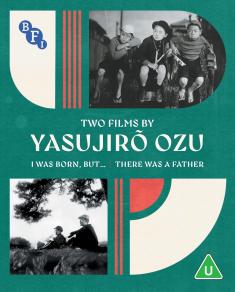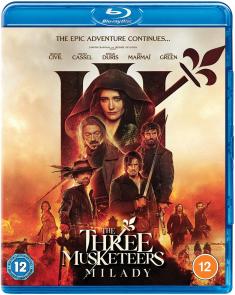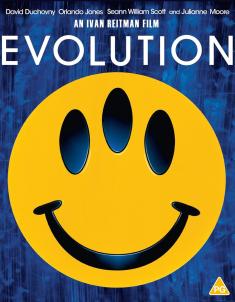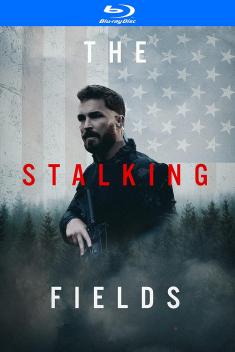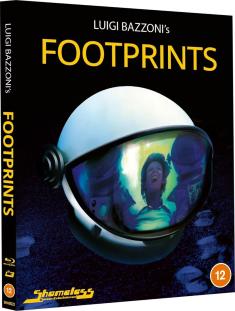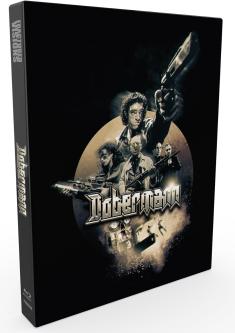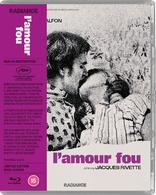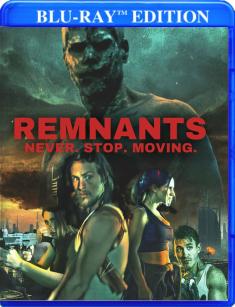Dont Look Back (Criterion Collection)
Overview -
Bob Dylan is captured on-screen as he never would be again in this groundbreaking film from D. A. Pennebaker. The legendary documentarian finds Dylan in London during his 1965 tour, which would be his last as an acoustic artist and marked a turning point in his career. In this wildly entertaining vision of one of the twentieth century’s greatest artists thrust into the spotlight, Dylan is surrounded by teen fans; gets into heated philosophical jousts with journalists; and kicks back with fellow musicians Joan Baez, Donovan, and Alan Price. Featuring some of Dylan's most famous songs, including "Subterranean Homesick Blues," "The Times They Are A-Changin'," and "It's All Over Now, Baby Blue," Dont Look Back is a radically conceived and shot portrait of an American icon that has influenced decades of vérité behind-the-scenes documentaries.
Storyline: Our Reviewer's Take

D.A. Pennebaker filmed 'Dont Look Back' during Bob Dylan's 1965 tour of England in support of his recently released "Bringing It All Back Home." It was his fifth album and it revealed yet another side of Dylan who strove to evolve from being the folk-singing voice of a generation whose songs became civic protest anthems into a rock-and-roll poet. Rather than a concert film, the camera frequently records Dylan and those around him offering a more complete portrait of the artist.
The film opens with the iconic proto music video for "Subterranean Homesick Blues." Shot in an alleyway in a single take, Dylan flips through a series of cards, attempting to match the words written on them with the lyrics as the song plays, although he's not overly concerned about it. Beat poet Allen Ginsberg and tour manager Bob Neuwirth are in the background having a conversation. The song's rollicking electric music is a sharp contrast to the acoustic sounds of Dylan's previous work, and announces, as it did as the opening track of "Bringing…" to alter your expectations. Not all his fans at the time were willing, which was their loss.
'Dont Look Back' shows life on the road and in the spotlight has its obvious pressures, and dealing with the press seems a necessary evil. For some reason, right before going on stage, Dylan and his cohorts are slightly combative/playing around with college journalist/science student Terry Ellis in a discussion that is more about Ellis than Dylan, which entertains, and likely distracts Dylan from what lies ahead. Ellis would go on to co-found Chrysalis Records a few years later. Dylan is even more acerbic and antagonistic towards Time's London correspondent Horace Freeland Judson, who takes the brunt of Dylan's critique of the press.
Dylan is at his angriest during a get-together at his hotel late one evening. One of his inebriated guests threw a glass out the window and no one would admit to it. In addition to the damage it causes to the limo below, Dylan understandably doesn't want to deal with the unnecessary potential hassle because obviously if this makes the papers or if anyone had been hurt, Dylan would have been held responsible and he doesn't even know some of the people hanging around. He gets into a shouting match with the drunken man supposedly responsible but then dismisses the car's driver who when he comes to the door.
On stage is when Dylan is at his most compelling even though the visuals are at their least. The limitations Pennebaker worked under are such a contrast to the many of the slickly edited musical videos of the day. Having just one camera, he got into position and shot Dylan in long takes with little camera movement. This allows the viewer to focus on and appreciate the lyrics, music and performance. It's rather amazing how he captivated an audience, standing under a lone spotlight on a bare stage with just a guitar and a harmonica.
Pennebaker's 'Dont Look Back' is a fascinating documentary that captures a few days and nights of Bob Dylan's life as he transitioned from beloved folk music hero to a musician exploring different forms of expression in his music and lyrics. A couple of months after these concerts, he would make more definitive proclamations with his infamous appearance playing rock at the Newport Folk Festival and the release of the predominantly electric album "Highway 61 Revisited." Regardless of the title, it's well worth looking back at this time in Dylan's career.
The Blu-ray: Vital Disc Stats
'Dont Look Back' (#786 in The Criterion Collection) comes on a 50GB Region A Blu-ray disc that sits in a fold-over digipak with a booklet. Together, they fit within a cardboard box. The discs boot up directly to the menu screen without any promotional advertisements. The 35-page booklet features Robert Polito’s “Everybody Loves You for Your Black Eye.”
Video Review

The video has been given a 1080p/AVC-MPEG-4 encoded transfer displayed at 1.37:1. "This new digital transfer was created in 4K resolution on a Lasergraphics Director film scanner from the 16 mm A/B original negative. Thousands of instances of dirt, debris, scratches, splices, and warps were manually removed using MTI's DRS, while Digital Visions Phoenix was used for small dirt, grain, noise management, jitter, and flicker," according to the liner notes.
Pennebaker appears to have had little control in terms of the cinematography so he captured what he could as it happened. He captured things as they happened, focusing the camera on the fly, which led to moments where objects were out of focus, losing their depth and detail within in a shot. But once he was set up, those elements usually remained consistent until the scene changed or there was a dramatic change within the scene.
Black levels also varied. Some times they were dark and inky, even leading to crushing such as when Dylan was on stage and hair and leather jacket blended into the darkness or when he rushed out of a theater into a waiting car through a throng of excited fans. Other times the blacks could be faint and light. The more light in a scene the better the range of grays appear but too much light and sunshine pushes the whites to border on posterization.
The blown-up 16mm led to a lot of grain, which increased when Dylan sings "It's All Over Now, Baby Blue" in a hotel room and "It'a Alright, Ma (I'm Only Bleeding)" on stage. Hairs appear in the frame during a couple of scene, a 1963 performance of Dylan playing "Only a Pawn in their Game" in a Mississippi field and as Dylan types in a hotel room while Baez sings.
Audio Review

"The original monaural soundtrack was remastered at 24-bit from the original quarter-inch magnetic tracks. Clicks, thumps, hiss, hum, and crackle were manually removed using Pro Tools HD, AudioCube's integrated workstation, and iZotope RX 4."
Pennebaker was just as limited, if not more so, in terms of the audio. Much of the dialogue is clear and understandable. Other times it is hard to make out, such as when it is drowned out in a hotel while "Maggie’s Farm" is playing or when Judson's voice is barely heard when he is asking questions off camera. Some times it's a result of the venue, such as when the applause and guitar sound louder than Dylan's vocals at the start of "The Times They Are a-Changin'".
The music is mostly Dylan on guitar, with occasional harmonica, and also some piano playing occurring off stage. The track sounds free of damage, but the mono soundtrack reveals its age as it limits the dynamic range of the music. Bass is negligible.
Special Features

- Commentary – Recorded in 1999, Pennebaker and tour manager Bob Neuwirth talk about what went on while they made the film, the challenges, and the times. Helps fill the gaps of what occurred.
- Dylan on Dont Look Back (HD, 4 min) – Audio excerpt from Dylan interview made during making of Martin Scorsese’s 2005 documentary 'No Direction Home', cut to previously unseen outtakes from 'Dont Look Back'. –
- 65 Revisited (HD, 65 min) – A 2006 documentary by Pennebaker compiled from 'Dont Look Back' outtakes. There are familiar settings with different content. Best parts are the extra performances and the alternative "Subterranean Homesick Blues" music video shot on a rooftop.
- Greil Marcus and D.A. Pennebaker (HD, 18 min) – A conversation between the music critic and the director about the film from 2010. Some new stories, some previously covered.
- “Subterranean Homesick Blues” (Alternate Take) (HD, 2 min) – A third version of the song shot in a garden at London’s Savoy Hotel.
- Additonal Audio Performances (Audio only) – Five performances recorded during the tour that aren’t included in the film: “It Ain’t Me, Babe” (4 min); “It’s All Over Now, Baby Blue” (8 min); “Love Minus Zero/No Limit (5 min); “The Lonesome Death of Hattie Carroll” (7 min); and “To Ramona” (4 min). They were remixed in 1999 and sound pristine.
- D.A. Pennebaker: A Look Back (HD) – It Starts with Music (29 min) is a new documentary about Pennebaker and his early short films, three of which are here: his first film, 1953's Daybreak Express' (5 min), with an intro by D.A. Pennebaker; 1954's 'Baby' (6 min) with his toddler daughter; and 1964's 'Lambert & Co.' (14 min).
- D.A. Pennebaker and Bob Neuwirth (HD, min) – New conversation between the two about working together on 'Dont Look Back', 'Monterey Pop', and other projects.
- Snapshots from the Tour (HD, 26 min) – Even more outtakes from 'Dont Look Back'.
- Patti Smith (HD, 14 min) – Recorded in 2015, Smith talks about the influence of Dylan and Nuerwith on her, and her interactions with them.
- Trailer (HD, 2 min) – Is basically the "Subterranean Homesick Blues" segment.
'Dont Look Back' was recorded at a pivotal time in the career of Bob Dylan, arguably the most important musician of the 20th century, and presents an intriguing look both on and off stage. Criterion's HD presentation is likely as good as it can be due to the limitations of the source. If anyone argues both the audio and video could be a half point higher or lower, I wouldn't disagree because of how problematic both are at times. There's a great collection of extras that allow the viewer to delve deeper into Dylan, the times, and the film. Highly recommended, especially for fans of Dylan and rock music.
